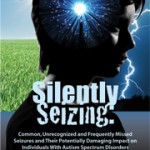 I received the book Silently Seizing a while back and only recently found the time to crack it open – and I’m glad I did! Most people recognize grand mal seizures. However not many know how to recognize an absence seizure, a partial seizure, or a complex partial seizure – they may interpret the odd behavior as a characteristic of autism. Recognizing possible seizure activity is only one of the areas covered in this book which was the winner of the prestigious National Parenting Publications Award. (I like this book so much I also posted about it on Psychology Today).
I received the book Silently Seizing a while back and only recently found the time to crack it open – and I’m glad I did! Most people recognize grand mal seizures. However not many know how to recognize an absence seizure, a partial seizure, or a complex partial seizure – they may interpret the odd behavior as a characteristic of autism. Recognizing possible seizure activity is only one of the areas covered in this book which was the winner of the prestigious National Parenting Publications Award. (I like this book so much I also posted about it on Psychology Today).
This clearly-written book is by Caren Haines, RN who is not only a registered nurse, but also the mother of a 24 year old son diagnosed with autism who suffers from seizures. Caren makes the important point that often times medical professionals analyze the behavior of a person with autism as just being part and parcel of autism, when in fact most of us parents and wise educators have figured out that all behavior is communication. In some cases, a child or teen may be having subclinical seizures and instead of treatment is given a behavior plan.
Caren shares not only how to recognize possible seizures, but describes the helpful data for parents to collect for the neurologist looking to see if a silent seizure disorder is present. As well, Caren shares her son’s experience as well as that of other families, which helps the reader understand more about life with seizures. Dr. Nancy Minshew and Dr. Darold Treffert provide valuable information as well. Also included in the book is a very helpful chart of medical tests to identify underlying causes of autism that may influence the ultimate prognosis of autism.
An important fact that I always tell my audience when I present on the topic of Adolescents and Autism: Many teens on the spectrum who have not been diagnosed as having seizures earlier, develop (or are identified as having) seizures during the teen years – probably related to puberty.
Parents should read this easy-to-digest book to understand more about seizures. It might make a big difference in your child’s life!